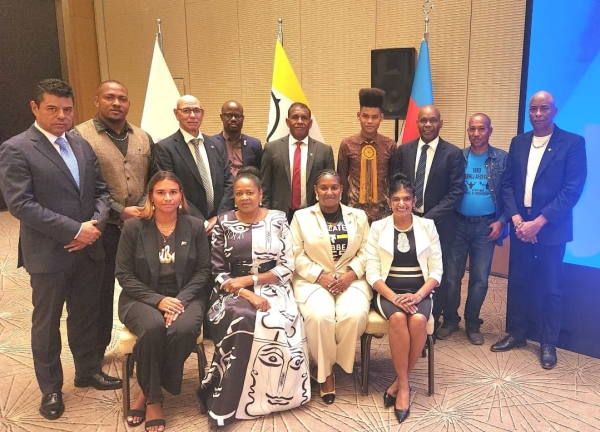 The Bonaire Human Rights Organization (BHRO) responds to Dr. Willem A. Cecilia's recent public letter with a firm, fact-based rebuttal. BHRO reaffirms its mission: to pursue justice, self-determination, and the restoration of democracy for the people of Bonaire in accordance with international law.
The Bonaire Human Rights Organization (BHRO) responds to Dr. Willem A. Cecilia's recent public letter with a firm, fact-based rebuttal. BHRO reaffirms its mission: to pursue justice, self-determination, and the restoration of democracy for the people of Bonaire in accordance with international law.
Dr. Cecilia, former Island Registrar and political surrogate for the status quo group that was overwhelmingly defeated in the 2015 referendum, continues to deny well-documented facts, exposing his opposition to the fundamental rights of the Bonairean people. His emotional defense of his former boss, ex-Lt. Governor Edison Rijna, whose record includes serious allegations of corruption and controversy, further undermines any claim to impartiality or credibility (see attached documentation).
1. Outdated Sources Ignore Post-2010 Developments -Dr. Cecilia’s reliance on Dr. S. Hillebrink’s 2007 analysis ignores the most critical events that followed, including the unlawful annexation of Bonaire on October 10, 2010. He omits key facts regarding the imposition of a constitutional status without the free and informed consent of the people. As noted by Professor René Soons and Charlotte Duijff in The Dissolution of the Netherlands Antilles (2011): “Especially the integration of the islands of Bonaire, Saba, and Sint Eustatius raises questions about the conformity with international law of their current status and the continued relevance of the right to self-determination.”
2. No Free or Fair Referendum in 2010- Contrary to Dr. Cecilia’s claims, there was no democratic mandate for Bonaire’s current status. The 2010 referendum process was actively obstructed by unelected officials, including Lt. Governor Thodé and Governor Goedgedrag. Bonaireans were denied their lawful right to vote on their political future.
This violation was documented by UN decolonization expert Dr. Carlyle Corbin in his 2010 legal paper, Self-Determination or Annexation? The Case of Bonaire, which concluded that the process contravened international legal standards.
3. Experts Confirm the Illegitimacy of Bonaire’s Status - The final report of the 2010 Referendum Committee, chaired by Dr. Mr. Douwe A.A. Boersema highlighted severe flaws: “The process failed to realize a clear or legitimate exercise of self-determination, leaving unresolved questions about Bonaire's political future and the will of its people.”
The Nunc Aut Numquam Report (2014), chaired by Mr. Eugene Abdul, reaffirmed that self-determination is central to Bonaire’s democratic future and emphasized the Netherlands’ legal duty to respect and facilitate this right. Minister Plasterk echoed this position in a 2014 letter, recognizing Bonaire’s inalienable right to self-determination.
Similarly, the 2020 Bonaire Self-Governance Assessment by the Dependency Studies Project concluded: “Bonaire’s current status reflects not self-governance but a modern form of colonial rule, which, while illegal under international law, persists due to power dynamics overriding principles of justice.”
4. Relisting Under Article 73 Is Legally Justified - Claiming that Bonaire cannot be relisted as a non-self-governing territory is incorrect. The 2022 Article 73 Factsheet by Dutch Professors Hoogers, Veenendaal, and Oostindie states: “No other state has been relieved of the Article 73 reporting obligation without the General Assembly affirming full self-government.” This confirms that the Netherlands’ current approach violates UN procedures and international norms.
5. Our Advocacy Reflects the People's Voice - In the 2015 referendum, 66% of Bonaireans rejected the imposed constitutional status. Ignoring this result—and dismissing calls for decolonization as “sensationalism”—denies the democratic will of the people. Speaking truth to power is not inflammatory; it is a moral obligation.
6. Climate and Cultural Justice Depend on Self-Determination - Environmental challenges cannot be addressed without political autonomy. Climate justice requires self-governance, equitable resource control, and equal standing in global negotiations, not the continued dependency status. Our concerns about cultural erosion and demographic shifts are grounded in evidence and daily experience. Denial does not erase reality.
The people of Bonaire have never been given a fair opportunity to exercise their right to self-determination. Instead, they have faced silent annexation, democratic erosion, and growing inequality. We call upon CARICOM, the United Nations, and the international community to recognize this injustice and support the relisting of Bonaire as a non-self-governing territory under Article 73 of the UN Charter.
Our demand is not rooted in division or emotion, but in law and justice.
James Finies
Bonaire Human Rights Organization (BHRO)
Bonaire Human Rights Organization
Kaya Libertador Simon Bolivar 26
Kralendijk, Bonaire










